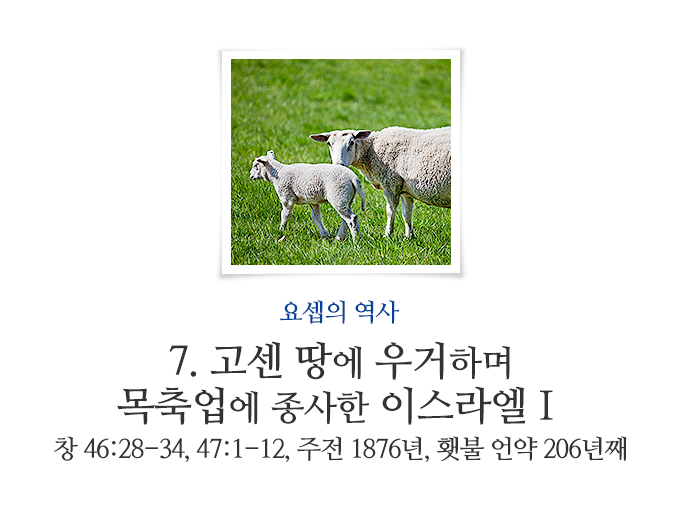
2017.01.20 13:31

야곱 130세, 요셉 40세
야곱의 70가족이 애굽으로 이주한 것과 고센 땅에 거하게 된 과정 속에는 하나님의 놀라운 구속사적 경륜이 담겨 있습니다. 애굽으로 이주한 이스라엘 백성은 애굽의 ‘고센’ 땅에 거하게 됩니다. 요셉은 자기 가족들이 살 곳으로 살기 좋고 편리한 애굽의 유명 도시가 아닌 ‘고센’ 땅을 선택하였습니다.
요셉은 형들 가운데 다섯 명을 택하여 바로 왕을 만나도록 하였는데, 이 때 형제들은 바로 왕에게 “종들이 이곳에 우거하러 왔사오니 청컨대 종들로 고센 땅에 거하게 하소서”(창 47:4)라고 요청하였습니다.
여기에 나오는 ‘우거’는 한자로 붙어살 우(寓), 살 거(居)로 ‘남의 집에 임시로 사는 것’, 또는 ‘타향에서 임시로 사는 것’을 뜻합니다. 히브리어로는 ‘구르’인데, 마찬가지로 ‘임시로 잠시 머무는 것’이란 뜻입니다(창 12:10, 35:27). 즉 애굽은 그들이 영원히 거주할 장소가 아니었다는 말입니다.
지금 이스라엘 백성이 애굽에 온 것은 “네 자손이 이방에서 객이 되어 그들을 섬기겠고”(창 15:13)라는 횃불 언약의 성취를 위해서 온 것이었지만, 언젠가는 횃불 언약에 따라 다시 애굽에서 나가야 했기 때문입니다.
왜 요셉은 이스라엘 백성이 임시 거주할 땅으로서 ‘고센’을 선택하였을까요?
(1) 신앙의 순수성을 지키기 위한 조치
고센 땅은 애굽 본토와 지리적으로 멀리 떨어진 곳으로서, 이스라엘 백성이 애굽의 우상 문화에 동화되지 않고 여호와 하나님을 믿는 순수한 신앙을 지킬 수 있었기 때문입니다. 만약 이스라엘 백성이 고센으로 가지 않고 애굽의 편리한 도시로 갔다면, 이스라엘 백성은 쉽사리 애굽 문화에 물들고 다신론적 우상 종교들로 인하여 신앙의 순수성에 큰 타격을 입었을 것입니다.
요셉은 형들과 아비의 권속들에게 만약 바로가 “너희의 업이 무엇이냐” 묻거든 “주의 종들은 어렸을 때부터 지금까지 목축하는 자이온데 우리와 우리 선조가 다 그러하니이다” 대답하라고 미리 말해두었습니다(창 46:33-34). 그 이유는 “애굽 사람은 다 목축을 가증히”(창 46:34下) 여기기 때문이라고 하였습니다.
여기 ‘가증히’는 히브리어로 ‘토에바’로서 ‘구역질나다, 혐오하다, 몹시 싫어하다’는 뜻입니다. 애굽 사람들은 목축에 대한 강한 경멸감을 가지고 있었던 것입니다. 따라서 목축업에 종사하고 있던 이스라엘은 상대하기 싫은 천박한 민족으로 알려져, 애굽 사람들은 그들과의 혼인을 아주 꺼리고, 고센 지역과 왕래도 하지 않았을 것입니다. 이로 인하여 이스라엘 백성은 자연히 고센 땅에만 거하는 고립된 상태가 되어 오히려 하나님의 백성으로서 신앙의 순수성을 지킬 수 있었습니다.
박윤식 목사 "잊어버렸던 만남" (휘선. 2016), 253-255쪽 中
Israel Dwells in the Land of Goshen and Raises Livestock (Gen 46:28-34; 47:1-12),
1876 BC, 206th Year of the Covenant of the Torch
Jacob's age, 130; Joseph's age, 40
The move of the 70 to Egypt and their dwelling place in Goshen were part of God's administration. Joseph did not choose a comfortable or a well-known city in Egypt for his family; he chose Goshen. Joseph chose five men among his brothers and presented them to Pharaoh. They spoke to him, saying, "We have come to sojourn in the land.... Now, therefore, please let your servants live in the land of Goshen" (Gen 47:4). The word sojourn means a temporary stay (in a foreign land). In Hebrew it is gur, meaning "to live temporarily" (Gen 12:10; 35:27). Thus, Egypt was not to be their permanent dwelling place.
Why did Joseph choose Goshen as Israel's temporary dwelling place?
(1) In order to protect the purity of faith
The land of Goshen was geographically distant from the population centers of Egypt, enabling the Israelites to keep their faith in the Lord pure without being influenced by the idol-worshiping Egyptian culture. If the Israelites had dwelt in one of the comfortable cities in Egypt, the purity of their faith would have become rapidly tainted by Egypt's polytheistic, idol-worshiping culture.
Joseph coached his father and his brothers in advance. If Pharaoh asked about their occupation, they were to answer, "Your servants have been keepers of livestock from our youth even until now, both we and our fathers" (Gen 46:33-34). Genesis 46:34 tells us this was because shepherds were loathsome to the Egyptians.
In Hebrew, the word loathsome is to eba, meaning "disgusting," "abominable," and "detestable." The Egyptians had great contempt for livestock keeping, and the Israelites who engaged in the occupation were known as a lowly nation. The Egyptians probably shunned the Israelites and refused to intermarry with them or travel within the region of Goshen. As a consequence, the Israelites were naturally sheltered in the land of Goshen and were able to protect their purity as a nation of God.